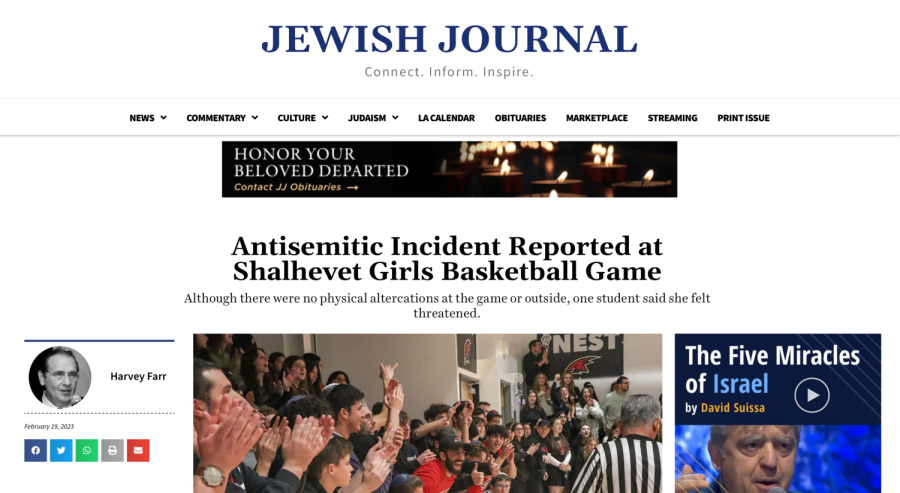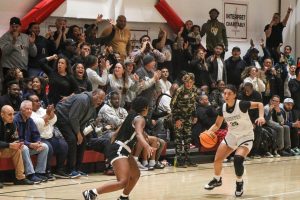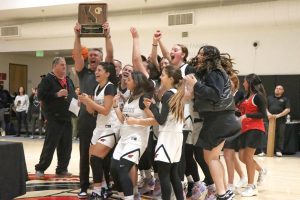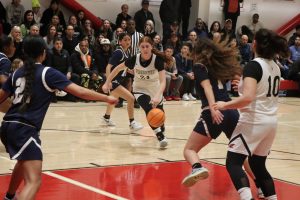EDITORIAL: When journalism goes wrong
BP Screenshot by Benjamin Gamson
The Jewish Journal’s story on the Shalhevet-Buena Park game had consequences that made matters worse.
March 21, 2023
“Antisemitic Incident Reported at Shalhevet Girls Basketball Game” was the headline attached to an article published by the Jewish Journal, a Los Angeles-based Jewish newspaper with a large website and Instagram following, the day after Shalhevet’s girls basketball fell to Buena Park High
School in the CIF Division 4AA semifinal game. The article, which on the day it was published almost every Shalhevet student had either read or heard about, was spreading misinformation and provoking unjustified rage against the people of Buena Park High School.
The supposed “antisemitic incident,” the story asserts, consisted of reports from two unnamed students about things that supposedly happened at the game. One example that they gave, of a girl feeling threatened when three Buena Park students “approached” her, was blatantly not anti-semitic.
The Boiling Point, using staff observations on the scene along with interviews and an anonymous
student survey, confirmed some but not all of the incidents the Jewish Journal cited – among them, Buena Park fans outside after the game holding up Palestinian flag images on their phones in front of Shalhevet students, clearly trying to upset them.
But it also discovered that Shalhevet students had made racist comments towards Buena Park students. Multiple BP staff members heard – alongside Buena Park’s taunts of “I love Kanye” and “Look at my Yeezys” – offensive statements coming from Shalhevet’s side of the court. Among them were students – some apparently middle schoolers – calling one of Buena Park’s players a “gorilla” as well as other comments about Buena Park students referencing fried chicken.
No such behavior is mentioned in the Jewish Journal’s article. From the Jewish Journal’s article, you would have thought that the Buena Park fans were a crowd full of antisemites who came to the game ready to hurl threats in our direction, while all Shalhevet fans were innocently cheering on their school.
While that might have been a great story, it’s not the truth.
The truth is more complicated. And although we can’t argue that the Boiling Point has the whole truth about what
happened that night, we can certainly say that the Jewish Journal missed a big part of it. They failed to capture in their report that the events at Shalhevet on the night of the game in-volved riled-up fans on both sides, and might have been nothing more than two groups of teenagers using harmful language – language that hurt more for each group than the other could have perceived – to get under each other’s skin.
Meanwhile, the damage done by it is larger than most who read it will ever see or know. It created a craze of victimization among the Shalhevet community and made some think Buena Park fans were a typical group that has hated and oppressed Jews in many times and places of our history. We found no evidence to show that.
And although we haven’t yet been able to speak with Buena Park fans, we can assume that the Jewish Journal’s article must have angered their community, disregarding their experiences of racism while displaying them all as antisemites.
Even if unintended, the result is that the Journal used the power of journalism – which when harnessed properly has the ability to unite communities of all backgrounds – to turn these two schools against each other. They did this by breaking the most basic journalistic principles, which all news organizations have the responsibility to abide by.
First, the most foundational one: they did not get multiple perspectives on the event, many of which the Boiling Point found were easily available. Their only two student interviews, both students at Shalhevet, were both anonymous.
Second, the story violated not only the basic rules of journalism but rules in the Torah. The Ninth Commandment states, “You shall not bear false witness against your neighbor.” We understand this to mean that Jews are prohibited from misrepresenting events through lies of omission as well as falsities, and including the presentation of actual facts in a way that obscures their meaning. In violating this commandment, the Journal neglects its responsibility as a Jewish newspaper to follow the values of our faith.
In a world where Jews are being targeted and antisemitism is on the rise, the Boiling Point believes the only way for journalism to protect us is with the truth – the whole truth. It’s hard to put out a fire once it’s lit, and any anger and mutual suspicion on both sides will be much harder to cool down than they would have been without this story.
So we call on the Jewish Journal to do everything it can to correct the narrative it spread so widely last week. They should update their story, including interviews with people from both schools, at least some on the record, and write a correction or editorial where they set the record straight. That means calling the “antisemitic incident” at our basketball game something else – even if it takes a little more research and a few extra words.
This story, under its print-edition headline of “What really happened,” won First Prize in Editorial Writing of the the 2024 Gold Circle competition of the Columbia Scholastic Press Association and Second Place for Non-first-person Opinion Writing in the 2024 Jewish Scholastic Journalism Awards. It also was republished in Best of SNO on March 30, 2023.


















Josh Goldner '16 • Mar 26, 2023 at 4:46 pm
This is great, thank you.